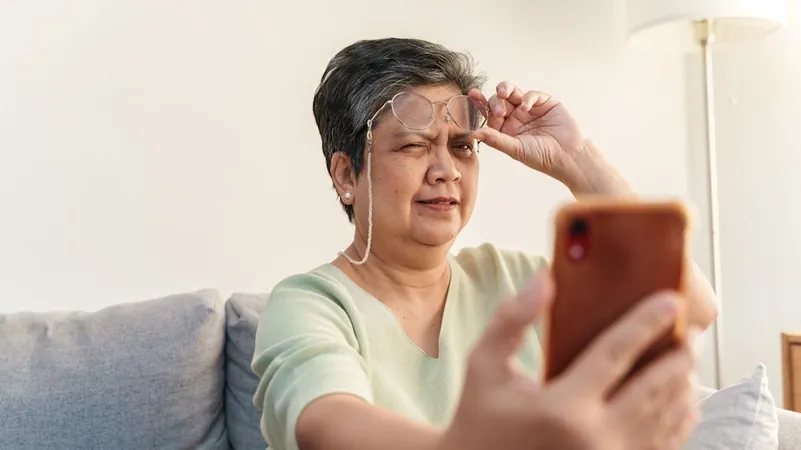
Your Vision Might Hold the First Clue to Dementia—12 Years Early!
2025-03-23
Author: Wai
Introduction
In a groundbreaking new study, researchers have unveiled a surprising connection between visual sensitivity and the early diagnosis of dementia, potentially allowing for detection up to twelve years before traditional methods would reveal the disease. This exciting research, published in the journal *Scientific Reports*, underscores the urgency for medical professionals to delve into eye health as a means of forecasting cognitive decline.
Dementia: A Growing Concern
Dementia is a growing concern among the aging population, with nearly 10% of American adults aged 65 and older affected by the condition. As rates are predicted to rise significantly in the coming years, establishing early detection methods is more crucial than ever.
The Spotlight on Vision
A collective of esteemed professionals, including Dr. Clifford Segil, D.O., a neurologist from Providence Saint John’s Health Center, Dr. Bavand Youssefzadeh, D.O., an ophthalmologist at the Global Lasik and Cataract Institute, and Dr. Amit Sachdev, M.D., M.S., the medical director at Michigan State University’s Neurology Department, contributed to the findings that could revolutionize how we approach dementia screening.
The Study Breakdown
The study involved monitoring 8,623 healthy participants in Norfolk, England, over several years, resulting in the diagnosis of dementia in 537 of them by the end. Testing began with a visual sensitivity assessment where participants responded to the appearance of a triangle amidst a flurry of moving dots. Interestingly, those who later received a dementia diagnosis exhibited slower response times in identifying the triangle, revealing a correlation between visual processing speed and cognitive decline.
The Complexity of Visual Impairment
Dr. Segil emphasizes the complexity of visual impairment in relation to dementia, noting that these changes are not simply a matter of needing stronger prescription glasses. They may be indicative of deeper neurological issues concerning memory and cognitive function.
Why Does Visual Sensitivity Matter?
The link between visual sensitivity and dementia may be tied to the impact of amyloid plaques—protein aggregates commonly found in Alzheimer’s patients—which seem to first affect regions of the brain responsible for visual processing before memory is impacted. Further investigations suggest that individuals with dementia might struggle with differentiating colors or visual contrast and face difficulty disregarding distractions, indicating that visual anomalies could indeed surface prior to more recognizable memory issues.
Contrary to Popular Practice
Contrary to popular practice, vision tests have not been central to dementia screening; instead, the focus has largely been on hearing tests, given their established relationship with cognitive health. As Dr. Segil states, hearing aids have shown potential to delay cognitive decline, yet visual processing remains largely unexamined.
Future Implications
Currently, visual sensitivity tests are not a standard part of traditional eye exams. Dr. Youssefzadeh notes that routine checks are typically centered around identifying signs of health concerns like high cholesterol or diabetes, which can exacerbate dementia risk. However, the new research hints that the incorporation of visual sensitivity assessments in clinical practice could be imminent as our understanding evolves.
Signs and Symptoms of Dementia
Dementia often manifests in various forms, beginning with subtle memory loss but potentially escalating to more profound cognitive dysfunction. According to the National Institute on Aging (NIA), key symptoms to be aware of include:
- Significant memory loss and confusion - Trouble with communication and expression - Disorientation in familiar surroundings - Difficulty managing finances - Repetitive questioning and unusual vocabulary usage - Slower completion of routine tasks - Loss of interest in everyday activities - Hallucinations or paranoia - Impulsive behavior and indifference towards others - Balance issues and mobility challenges
Dr. Segil emphasizes that early signs of dementia often reveal themselves in everyday life, such as difficulties with navigation or financial management.
Conclusion
In conclusion, the recent findings regarding visual sensitivity provide a thrilling glimpse into how we may identify dementia before it fully manifests. As research in this area continues to develop, healthcare professionals could be equipped with new tools that make all the difference in early intervention and patient care. Stay tuned—your vision may just be the key to unlocking a healthier future!


 Brasil (PT)
Brasil (PT)
 Canada (EN)
Canada (EN)
 Chile (ES)
Chile (ES)
 Česko (CS)
Česko (CS)
 대한민국 (KO)
대한민국 (KO)
 España (ES)
España (ES)
 France (FR)
France (FR)
 Hong Kong (EN)
Hong Kong (EN)
 Italia (IT)
Italia (IT)
 日本 (JA)
日本 (JA)
 Magyarország (HU)
Magyarország (HU)
 Norge (NO)
Norge (NO)
 Polska (PL)
Polska (PL)
 Schweiz (DE)
Schweiz (DE)
 Singapore (EN)
Singapore (EN)
 Sverige (SV)
Sverige (SV)
 Suomi (FI)
Suomi (FI)
 Türkiye (TR)
Türkiye (TR)
 الإمارات العربية المتحدة (AR)
الإمارات العربية المتحدة (AR)